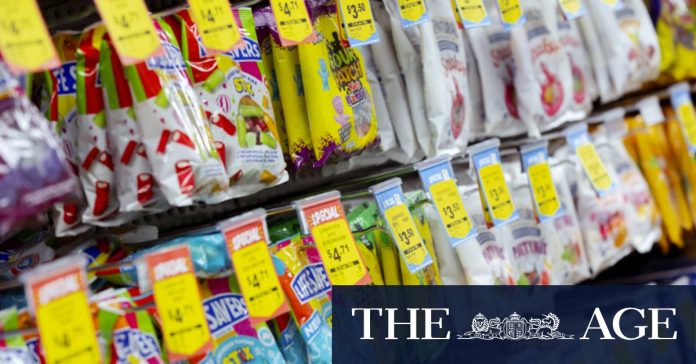[ad_1]
Many of these multinationals are major employers in Australia with production and manufacturing sites hiring thousands of staff, many of which are in regional areas.
Unilever’s submission shed some light on the price negotiation process, acknowledging that these conversations were “robust”. Retailers can vary on how they review supplier costs; some retailers only ask for notification, while others require justification.
“Increases in costs from warehousing, local transport/logistics, manufacturing or wages are not considered as justification by some retailers,” wrote Unilever Australia boss Nick Bangs.
“However, we know that these are critical and very real cost pressures throughout the supply chain, and as such they do form part of the rationale in our choosing to adjust list prices.”
According to Woolworths, multinational suppliers and their “must-have brands” accounted for more than 60 per cent of its sales in 2023, with the biggest 100 suppliers responsible for more than 80 per cent of all price increases.
The nation’s biggest supermarket chain said multinationals had at times withheld stock during price negotiations, a characterisation that Australian Food and Grocery Council (AFGC) chief executive Tanya Barden has rejected.
“To characterise it as a market of ‘price setters’ and ‘price takers’ […] does not reflect the range of other factors at play.”
Orlando Rodriguez, CEO of Coca-Cola Australia
Baked beans, condiments and jam maker Kraft Heinz also pushed back against this. “Kraft Heinz Australia does not threaten to withhold supply of any items as part of its commercial negotiations with retailers,” its submission stated.
In 2019, Australian shoppers were unable to purchase Nestle-owned Uncle Tobys oats after Woolworths refused to pass through a 6 per cent price rise. Customers were also unable to purchase pet food brands such as Whiskas and Pedigree from Woolworths and Coles following a similar situation with Mars Petcare.
The Senate committee into supermarket prices said it had sought to hear from eight multinationals – Coca-Cola, Kellanova (Kelloggs), Kraft Heinz, Mars, Nestle, PepsiCo, Procter & Gamble, and Unilever – but found their engagement unsatisfactory, with all companies stating they had not been given sufficient time to prepare and that key executives were on leave or overseas.

Coca-Cola’s Australia boss Orlando Rodriguez.Credit: Dean Sewell
“To say that officials were unavailable seems somewhat disingenuous to the committee,” the Senate committee said in its report.
The AFCG said it was disappointed multinationals had been given less than three days’ notice to appear before the inquiry.
“Many of the issues raised in the recommendations of the committee’s report are being looked at by the [Australian Competition and Consumer Commission’s] year-long inquiry,” said Barden. “Pricing arrangements in the industry are complex, making the ACCC well-placed to take up these matters.”
The inquiry has been calling for submissions since December 14 last year. The terms of references included a mandate to examine the role of multinationals, but none of them were called until enquiries made by this masthead.
Loading
Nestle’s submission said chief executive Sandra Martinez was on leave and abroad at the time and it was not able to find other representatives to appear before the inquiry. The Nescafe, KitKat and Milo maker’s latest financial report showed that annual profits fell 30 per cent to $88.9 million despite a 7.2 per cent revenue increase as commodity and supply chain prices rose significantly, indicating it is not passing on full costs to consumers.
In Coca-Cola’s submission, chief executive Orlando Rodriguez urged the Senate committee to “adopt a holistic view” of the food and grocery market, arguing that market dynamics of grocery retailers are complex.
“To characterise it as a market of ‘price setters’ and ‘price takers’, as has been stated during this inquiry, does not, in Coca-Cola’s view, reflect the range of other factors at play,” he wrote.
Jarden analyst Ben Gilbert said the Senate inquiry’s recommendations that multinationals and big box retailers be referred to the Economics References Committee for further inquiry were “the biggest surprise”.
“This, if it occurs, would see increased scrutiny over the grocery space and, most significantly, listed Australian big-box retailers which we expect would include Wesfarmers (i.e. Bunnings) and potentially go further to including electronics (JB Hi-Fi, Harvey Norman) and general merchandise (Super Retail Group, Chemist Warehouse), albeit inclusion of the latter would be less clear to us owing to the fact it was an inquiry into supermarket prices,” Gilbert wrote in a note to clients.
The federal government has three months to respond to the Senate inquiry’s final report.
The Business Briefing newsletter delivers major stories, exclusive coverage and expert opinion. Sign up to get it every weekday morning.
[ad_2]
Source link


